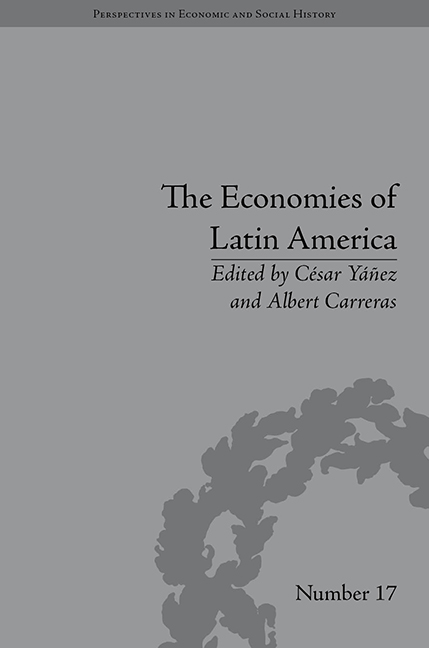Book contents
- Frontmatter
- CONTENTS
- List of Figures and Tables
- List of Contributors
- Preface
- Introduction: Latin American Economic Backwardness Revisited
- 1 Expectations, Institutions and Economic Performance: Latin America and the Western European Periphery during the Twentieth Century
- 2 On the Accuracy of Latin American Trade Statistics: A Non-Parametric Test for 1925
- 3 Latin America and Its Main Trade Partners, 1860–1930: Did the First World War Affect Geographical Patterns?
- 4 The Structure of Latin American Investment in Equipment Goods during the Mature Period of the First Globalization
- 5 Factorial Distribution of Income in Latin America, 1950–2000: New Series from the National Account Data
- 6 The Influence of the First World War on the Economies of Central America, 1900–29: An Analysis From a Foreign Trade Perspective
- 7 Economic Modernization in Adverse Institutional Environments: The Cases of Cuba and Chile
- 8 Capital Goods Imports, Machinery Investment and Economic Development in the Long Run: The Case of Chile
- 9 The Sugar Industry, the Forests and the Cuban Energy Transition, from the Eighteenth Century to the Mid-Twentieth Century
- 10 Empirical Debate on Terms Of Trade and the Double Factorial Terms of Trade of Colombia, 1975–2006
- 11 Public Revenues in Bolivia, 1900–31
- 12 The Consumption of Durable Goods in Latin America, 1890–1913: Analysis and Estimation of a Demand Function
- Notes
- Index
2 - On the Accuracy of Latin American Trade Statistics: A Non-Parametric Test for 1925
- Frontmatter
- CONTENTS
- List of Figures and Tables
- List of Contributors
- Preface
- Introduction: Latin American Economic Backwardness Revisited
- 1 Expectations, Institutions and Economic Performance: Latin America and the Western European Periphery during the Twentieth Century
- 2 On the Accuracy of Latin American Trade Statistics: A Non-Parametric Test for 1925
- 3 Latin America and Its Main Trade Partners, 1860–1930: Did the First World War Affect Geographical Patterns?
- 4 The Structure of Latin American Investment in Equipment Goods during the Mature Period of the First Globalization
- 5 Factorial Distribution of Income in Latin America, 1950–2000: New Series from the National Account Data
- 6 The Influence of the First World War on the Economies of Central America, 1900–29: An Analysis From a Foreign Trade Perspective
- 7 Economic Modernization in Adverse Institutional Environments: The Cases of Cuba and Chile
- 8 Capital Goods Imports, Machinery Investment and Economic Development in the Long Run: The Case of Chile
- 9 The Sugar Industry, the Forests and the Cuban Energy Transition, from the Eighteenth Century to the Mid-Twentieth Century
- 10 Empirical Debate on Terms Of Trade and the Double Factorial Terms of Trade of Colombia, 1975–2006
- 11 Public Revenues in Bolivia, 1900–31
- 12 The Consumption of Durable Goods in Latin America, 1890–1913: Analysis and Estimation of a Demand Function
- Notes
- Index
Summary
Introduction
The issue of the (in)accuracy of foreign trade statistics remains in the economics, development and trade literature to the present day. This chapter proposes a non-parametric test in order to establish the level of accuracy of the Latin American foreign trade statistics when contrasted with the trade statistics of the main trading partners.
The study of Federico and Tena showed that, in historical terms, the accuracy of foreign trade statistics seems to be more robust than previously thought. The results of this chapter also point in such a direction. Nevertheless, this chapter departs from previous exercises regarding the (in)accuracy of foreign trade data in several aspects. First, the chapter focuses in the trade of a particular region in a single year. That is the chapter provides a test for the accuracy of the foreign trade statistics of seventeen Latin American countries for the year 1925. Second, rather than testing for the accuracy of the overall trade figures, the test is performed on data registered for a couple of quite homogeneous products, petroleum products and mineral coal. Third, the test applies to the accuracy of both the volumes and values registered on the official statistics of the exporting and importing countries. Most previous exercises did only test for the accuracy of the values registered, since the aggregate trade figures were used.
- Type
- Chapter
- Information
- The Economies of Latin AmericaNew Cliometric Data, pp. 41 - 58Publisher: Pickering & ChattoFirst published in: 2014



